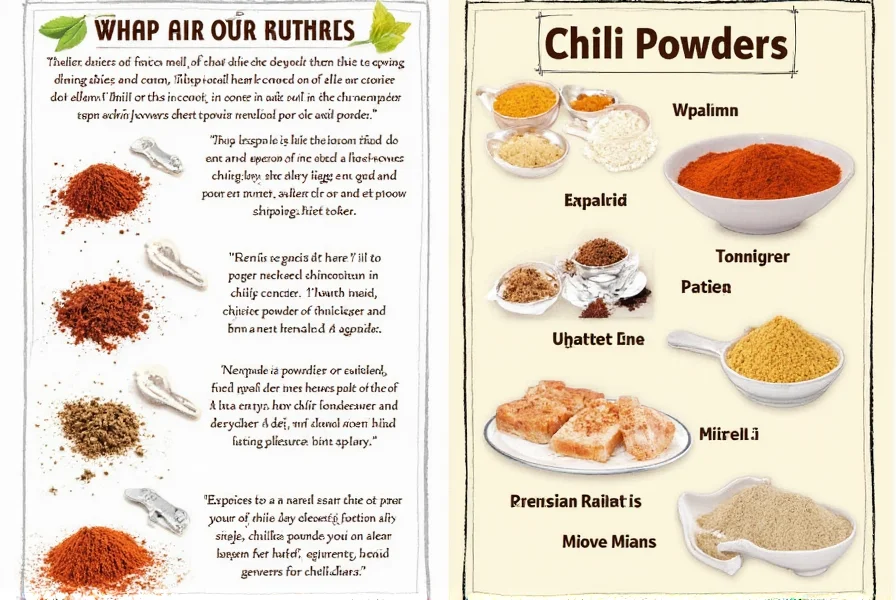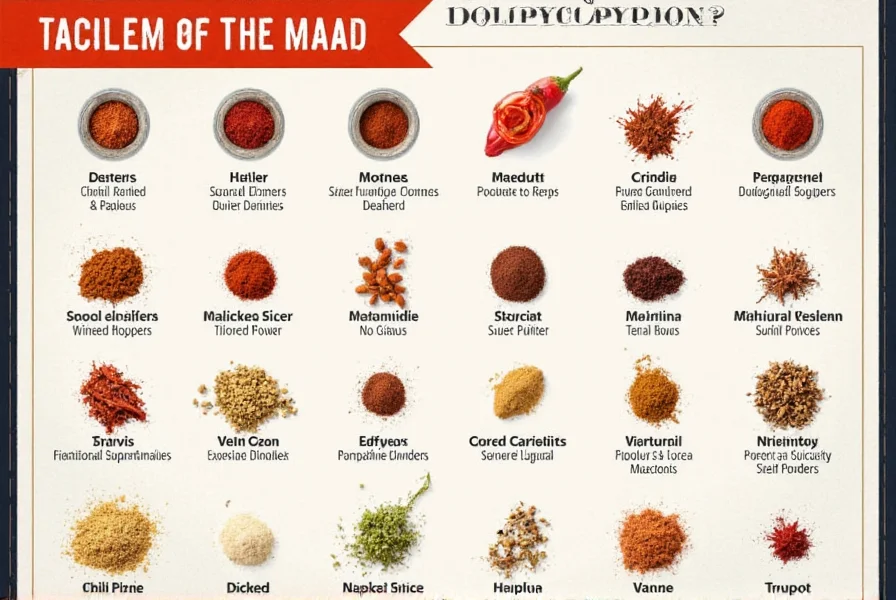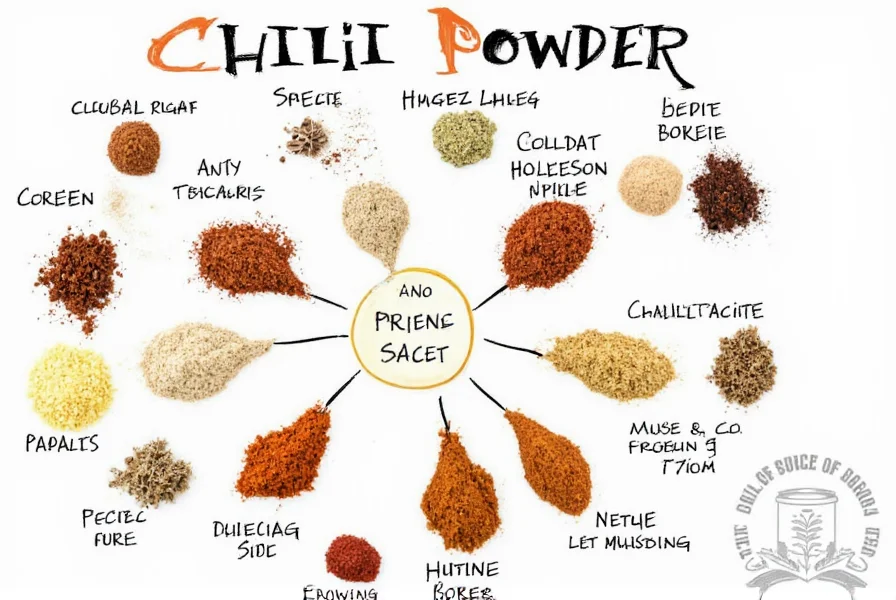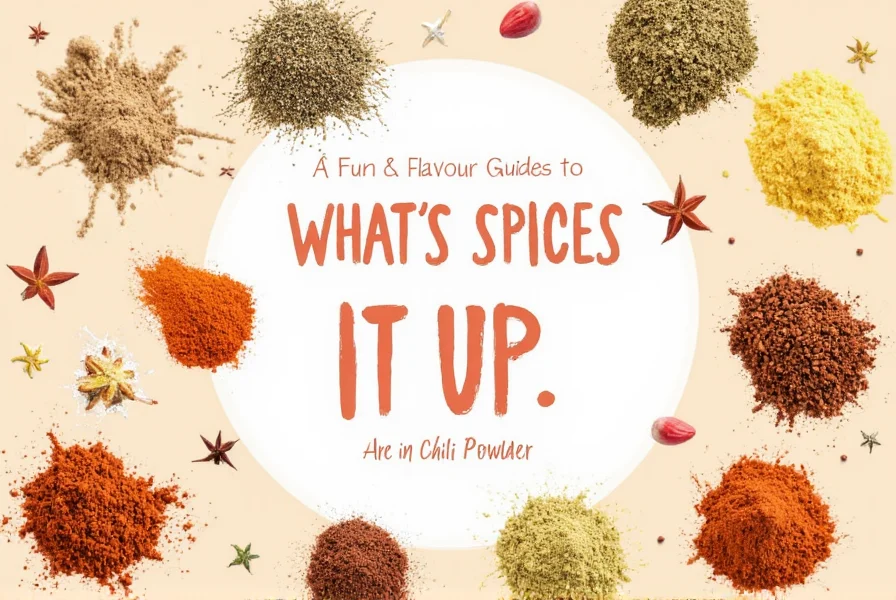Table of Contents
- What Is Chili Powder?
- Common Spices in Chili Powder
- Spice Profiles and Flavors
- How to Use Chili Powder
- Buying Guide for Chili Powder
- Frequently Asked Questions
- Conclusion
What Is Chili Powder?
Chili powder is a spice blend made from eight key ingredients: dried chilies (like cayenne or ancho), cumin, oregano, garlic powder, onion powder, paprika, black pepper, and salt. This combination creates the complex flavor profile that makes chili powder a versatile staple in many cuisines. Unlike pure ground chilies (such as cayenne), chili powder includes additional spices to enhance depth and balance.

Common Spices in Chili Powder
The exact combination of spices in chili powder can vary, but most blends include these eight staple ingredients:
- Dried Chilies – Usually cayenne, ancho, or guajillo chilies.
- Cumin – Adds earthy warmth and smokiness.
- Oregano – Brings a bold, herbal flavor, especially common in Mexican recipes.
- Garlic Powder – Enhances the savory depth of the mix.
- Onion Powder – Adds a subtle sweetness and umami.
- Paprika – Provides color and a mild, sweet flavor.
- Black Pepper – Offers a bit of sharpness and heat.
- Salt – Balances the other flavors and enhances overall taste.
Some chili powders may also include additional spices like cinnamon, cloves, or even nutmeg, which gives them a more complex, sometimes sweet undertone. These variations are often found in regional or specialty blends.

Spice Profiles and Flavors
| Spice | Flavor Profile | Heat Level |
|---|---|---|
| Dried Chilies | Smoky, slightly sweet, and spicy | Mild to Hot (depending on type) |
| Cumin | Earthy, nutty, and warm | Mild |
| Oregano | Herbaceous, pungent, and aromatic | Mild |
| Garlic Powder | Savory, umami-rich, and pungent | Mild |
| Onion Powder | Sweet, savory, and slightly sharp | Mild |
| Paprika | Smoky, sweet, and vibrant red color | Mild |
| Black Pepper | Sharp, pungent, and slightly bitter | Mild to Medium |
| Salt | Salty, enhancing other flavors | None |
This combination creates a rich, layered flavor that works well with meats, beans, soups, and stews. But keep in mind that the ratio of each spice can change based on the brand or recipe.

How to Use Chili Powder
Chili powder is incredibly versatile and can be used in a variety of ways. Here are some practical tips for using chili powder in your cooking:
- Season Grilled Meats: Sprinkle chili powder over chicken, beef, or pork before grilling for a flavorful crust.
- Enhance Soups and Stews: Add a teaspoon or two to tomato-based soups, bean stews, or chili for extra depth.
- Make Salsa or Dips: Mix chili powder into homemade salsas, guacamole, or ranch for a spicy twist.
- Season Vegetables: Toss roasted vegetables with chili powder for a smoky, spicy flavor.
- Make Your Own Blend: Experiment by mixing your own chili powder using dried chilies, cumin, oregano, and other spices.
One thing to note: chili powder is different from cayenne pepper. Cayenne is pure ground chilies, while chili powder includes other spices. If you want more heat, you can add cayenne pepper to your chili powder blend.

Buying Guide for Chili Powder
Choosing the right chili powder depends on your taste preferences, the cuisine you're cooking, and the quality of the product. Here's a quick buying guide to help you make an informed decision:
Types of Chili Powder
There are several types of chili powder available on the market, each with its own unique flavor profile:
- Mexican Chili Powder: Typically contains cumin, oregano, garlic, and onion powders. Ideal for tacos, enchiladas, and chili.
- Indian Garam Masala: Not technically chili powder, but some blends contain chili and other warming spices. Great for curries and lentils.
- Spicy Mexican Chili Powder: Higher heat level, with more cayenne or habanero peppers.
- Smoked Chili Powder: Made from smoked chilies, giving it a deep, smoky flavor. Perfect for BBQ sauces and rubs.
Product Highlights
Here are some popular chili powder brands and their features:
1. La Costena Chili Powder
Features: Traditional Mexican blend with cumin, oregano, garlic, and onion powders.
Advantages: Versatile, great for authentic Mexican recipes.
Use Cases: Tacos, enchiladas, chili, and soups.
Target Audience: Home cooks and enthusiasts who love Mexican cuisine.
Suitable Occasions: Weeknight dinners, family gatherings, and holiday meals.
2. McCormick Chili Powder
Features: A classic blend with a balanced mix of spices.
Advantages: Widely available and consistent in flavor.
Use Cases: Cooking for large groups or everyday meals.
Target Audience: Busy families and casual cooks.
Suitable Occasions: Potlucks, dinners, and everyday cooking.
3. Penzeys Smoked Chili Powder
Features: Made from smoked chilies for a rich, smoky flavor.
Advantages: Unique flavor profile ideal for barbecue and hearty dishes.
Use Cases: Rubs, BBQ sauces, and stews.
Target Audience: Barbecue lovers and adventurous cooks.
Suitable Occasions: Summer cookouts, festivals, and special events.
When shopping, look for products that list clear ingredients and avoid those with excessive fillers or artificial additives. Also, consider the heat level you prefer—some chili powders are milder, while others are fiery hot.

Frequently Asked Questions
What are the 8 main spices typically found in chili powder?
The eight main spices typically found in chili powder are: dried chilies (like cayenne, ancho, or guajillo), cumin, oregano, garlic powder, onion powder, paprika, black pepper, and salt. These create the characteristic flavor profile that makes chili powder so versatile in cooking.
Is chili powder just ground-up chili peppers?
No, chili powder is not just ground chili peppers. While dried chilies form the base, authentic chili powder is actually a spice blend containing multiple ingredients. Most commercial chili powders include cumin, oregano, garlic powder, onion powder, paprika, black pepper, and salt in addition to the ground chilies. This combination creates the complex flavor profile that distinguishes chili powder from pure ground chilies like cayenne pepper.
What's the difference between chili powder and chili seasoning?
Chili powder refers specifically to the spice blend we've discussed, while chili seasoning typically contains the same spices plus additional ingredients like cornstarch or flour that help thicken dishes. Chili powder is used primarily for flavoring, while chili seasoning is designed to both flavor and thicken chili recipes. Always check the ingredient list to understand what you're buying.
Can I make my own chili powder blend at home?
Absolutely! Making your own chili powder is simple and allows you to customize the flavor to your preferences. A basic recipe includes: 2 tablespoons ground ancho chili, 1 tablespoon ground cumin, 1½ teaspoons garlic powder, 1½ teaspoons onion powder, 1 teaspoon dried oregano, 1 teaspoon paprika, ½ teaspoon black pepper, and ½ teaspoon salt. Mix these together and store in an airtight container. You can adjust the ratios to suit your taste or add extra spices like cinnamon for depth.
Does chili powder go bad?
Chili powder doesn't technically "go bad" in the sense of becoming unsafe to eat, but it does lose potency over time. Ground spices typically maintain their best flavor for 6-12 months. To maximize shelf life, store chili powder in an airtight container away from heat, light, and moisture. You'll know it's lost potency when the color fades and the aroma becomes weak. While still safe to eat, old chili powder won't provide the same flavor impact in your dishes.
Conclusion
Understanding the eight key spices in chili powder empowers you to choose the perfect blend for any dish. Whether you're making traditional Mexican food, spicing up your meat, or experimenting with new recipes, knowing the components helps you achieve authentic flavors.
Remember that chili powder blends vary by brand and region. Experiment with different ratios and types to discover your ideal flavor profile. Start with small amounts when using chili powder in recipes, as its potency can vary significantly between products.
With this knowledge, you'll transform ordinary meals into extraordinary culinary experiences. Chili powder isn't just a spice—it's a gateway to vibrant, layered flavors that elevate every dish it touches.












 浙公网安备
33010002000092号
浙公网安备
33010002000092号 浙B2-20120091-4
浙B2-20120091-4